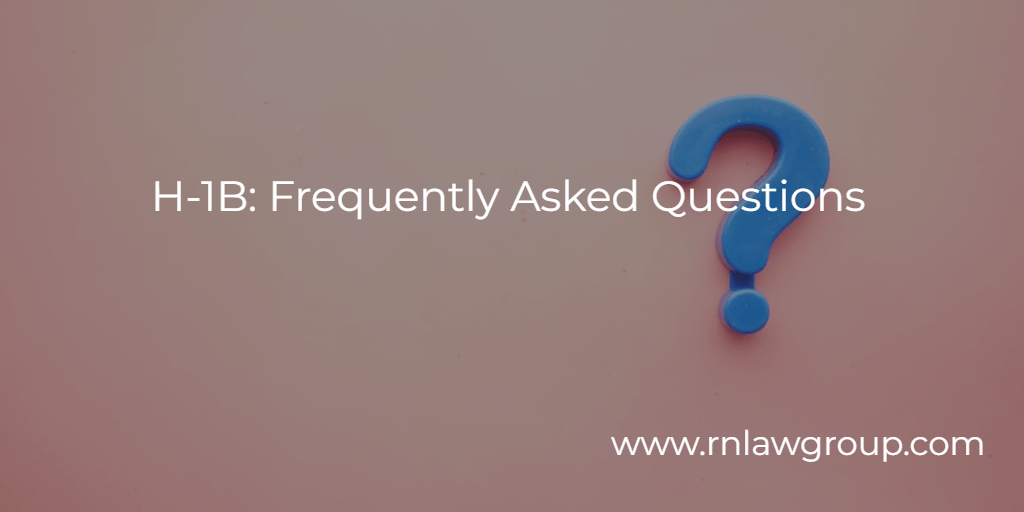
H-1B: Frequently Asked Questions
What is an H-1B visa?
The H-1B visa program was created to help American firms fill specialized job openings that are difficult for American workers to fill. There is a cap on the total number of visas that may be awarded annually leading to strong competition for these visas.
Who can obtain an H-1B visa?
You must fulfill the following requirements in order to be qualified for an H-1B visa:
- According to U.S. immigration law, the role you will be filling must be a “specialty occupation.” This covers disciplines like architecture, engineering, math, physical and social sciences, health and medical care, education, law, accounting, business, and some computer-related occupations.
- For the role you will be filling, you must have a bachelor’s degree or its equivalent in a comparable discipline. Sometimes a bachelor’s degree can be replaced with a combination of education and work experience.
- Your U.S. employer must obtain a labor certification from the Department of Labor and file a petition with the U.S. Citizenship and Immigration Services (USCIS). The petition must demonstrate that you are being offered a job in a specialty occupation by the employer and that you are qualified for the position based on your training and work history.
- You must be able to demonstrate that you will only be working in the US temporarily and that, after your H-1B visa expires, you intend to return to your home country
What is the H-1B visa application process?
There are multiple steps in the application process for an H-1B visa, including getting a Labor Condition Application (LCA) from the U.S. Department of Labor, submitting an H-1B petition to U.S. Citizenship and Immigration Services (USCIS), and appearing in person for an H-1B visa interview.
A simplified explanation of the application process:
- Look for a company that will sponsor you for an H-1B visa. You must apply through this employer;
- The employer will submit documentation to the government demonstrating that you are being hired for a specialized position, that you will be paid fairly, and that you will have favorable working circumstances;
- After reviewing the documentation, the government will determine whether to accept or reject the application; and
- Upon approval, you will be informed and given permission to enter the country and start working for the company that sponsored you.
How long can I stay in the US on an H-1B visa?
With the H-1B visa, foreign nationals have the opportunity to extend their employment in the United States for an additional three years after the initial three-year period. After six years, the foreign national must leave the country and stay abroad for at least one year before becoming qualified for a new H-1B visa.
The six-year limit is subject to various exceptions, though. For instance, if the individual has an approved I-140 immigrant petition, but is unable to adjust their status due to visa backlog or other reasons, they may be eligible for an H-1B extension beyond the six-year limit.
Can I apply for permanent residency (green card) while on an H-1B visa?
It is possible to apply for a green card (permanent status) while holding an H-1B visa. In fact, a lot of people with H-1B visas use their employment as a stepping stone to obtaining permanent status in the US.
While holding an H-1B visa, there are numerous routes to apply for a green card, including:
- 1. A green card based on employment: Your employer may submit a petition for an employment-based immigrant visa on your behalf if they are willing to sponsor you for permanent residence. Employment-based green cards fall under a number of categories, including EB-1 for people with outstanding ability, EB-2 for people with advanced degrees or excellent ability, and EB-3 for skilled workers and professionals.
- Family-based green card: If a member of your immediate family is a citizen or lawful permanent resident of the United States, they may be able to sponsor you for a green card based on your family.
- 3. Diversity visa lottery: The United States government organizes a diversity visa lottery every year to give people from nations with historically low rates of immigration to the country a route to permanent residency.
Can my spouse and children accompany me on an H-1B visa?
Yes, your spouse and children (under the age of 21 and unmarried) can accompany you to the United States on an H-4 dependent visa. If you have an H-1B visa, you can either include your spouse and children in your application or submit a different application for them later.
Your spouse and children are permitted to remain in the country if they enter on an H-4 visa as long as you keep your H-1B status. They are also permitted to enroll in educational institutions in the US, but they cannot work there. If your I-140 petition has been approved, your spouse may be eligible to apply for work authorization.
What happens if I lose my job while on an H-1B visa?
While on an H-1B visa, losing your employment could present some difficulties, but you do have options.
It’s crucial to first understand that your H-1B visa is dependent on your employment. If you lose your employment, your H-1B status will no longer be valid, and you will need to take steps to either regain your status or leave the United States. Current regulations, allows H-1B visa holders a grace period of 60 days for them to leave the country or find a new job and start working for a new employer.
Here are some options to consider:
- Look for a new job: You can transfer your H-1B visa to a new employer if you find a new position with a different company that will sponsor you for a visa. The H-1B transfer procedure enables you to begin working for the new company as soon as USCIS receives the transfer petition.
- Change status: You might be able to switch to another nonimmigrant visa category that allows you to remain in the US if you are unable to immediately find a new work, such as a B-2 visitor’s visa or an F-1 student visa.
- Leave the United States: If you are unable to find a new job or change your status, you will need to leave the United States before your authorized stay expires. It’s important to do this in a timely manner, as overstaying your authorized stay can have serious consequences and may impact your ability to return to the United States in the future.
Can I switch jobs while on an H-1B visa?
Yes, you are able to change jobs by completing an H-1B transfer process. This procedure entails looking for a new company who will sponsor you for a new H-1B visa and submitting a new H-1B petition to the U.S. Citizenship and Immigration Services (USCIS).
What is the prevailing wage, and how is it determined for H-1B visa holders?
Employers who hire individuals with H-1B visas are required to pay them at least the prevailing wage. The prevailing wage is the minimum wage that must be paid to H-1B visa holders by their employers. The job position, the job location, and the level of experience required for the position are factors that are used to determine the prevailing wage.
Can my H-1B be revoked if I get a DWI?
If an H-1B visa holder is found guilty of a DWI (driving while intoxicated) or other crime, their visa may be canceled. In general, nonimmigrant visa holders, such as those with H-1B visas, may be affected by any criminal record.
The provisions of the H-1B visa may be violated by a DWI conviction since the U.S. government takes criminal convictions seriously. The H-1B visa may be revoked by the U.S. Citizenship and Immigration Services (USCIS) if they learn of a DWI conviction or other criminal conduct.
A DWI conviction can have additional major repercussions aside from possible immigration issues, such as fines, license suspension, and possibly jail time.
Can I get an H-1B visa if I have DWI conviction?
If you have been convicted of DWI (driving while intoxicated), you may still be eligible for an H-1B visa, but it may depend on the particulars of your case. A DWI conviction could be considered a violation of the terms of the H-1B visa and could potentially impact your eligibility for the visa.
The gravity of the offense, the nature of the job you will be performing, and whether the conviction qualifies as a “crime involving moral turpitude” or not will all be taken into account by USCIS when reviewing your visa application. A DWI conviction typically won’t prevent someone from applying for an H-1B visa, but it may complicate the process and require more documentation or an explanation.
If you are interested in applying for an H-1B, get started by consulting with an experienced business immigration attorney.
By: Felipe Jimenez
Felipe Jimenez is an Associate Attorney at Reddy Neumann Brown PC. He works in the H-1B Department where he assists clients through all phases of the non-immigrant visa process.
Reddy Neumann Brown PC has been serving the business community for over 20 years and is Houston’s largest immigration law firm focused solely on US. Employment-based immigration. We work with both employers and their employees, helping them navigate the immigration process quickly and cost-effectively.

